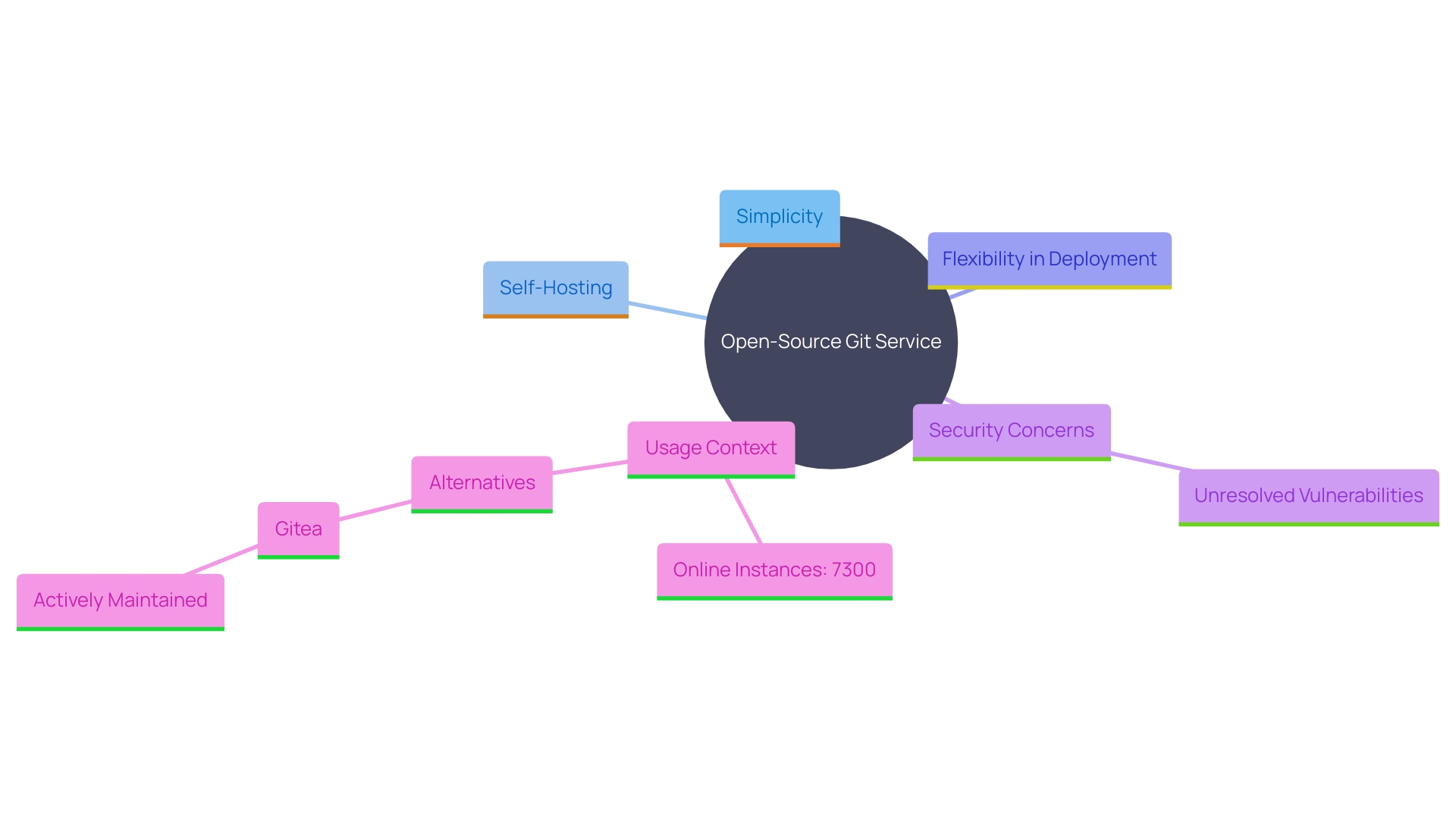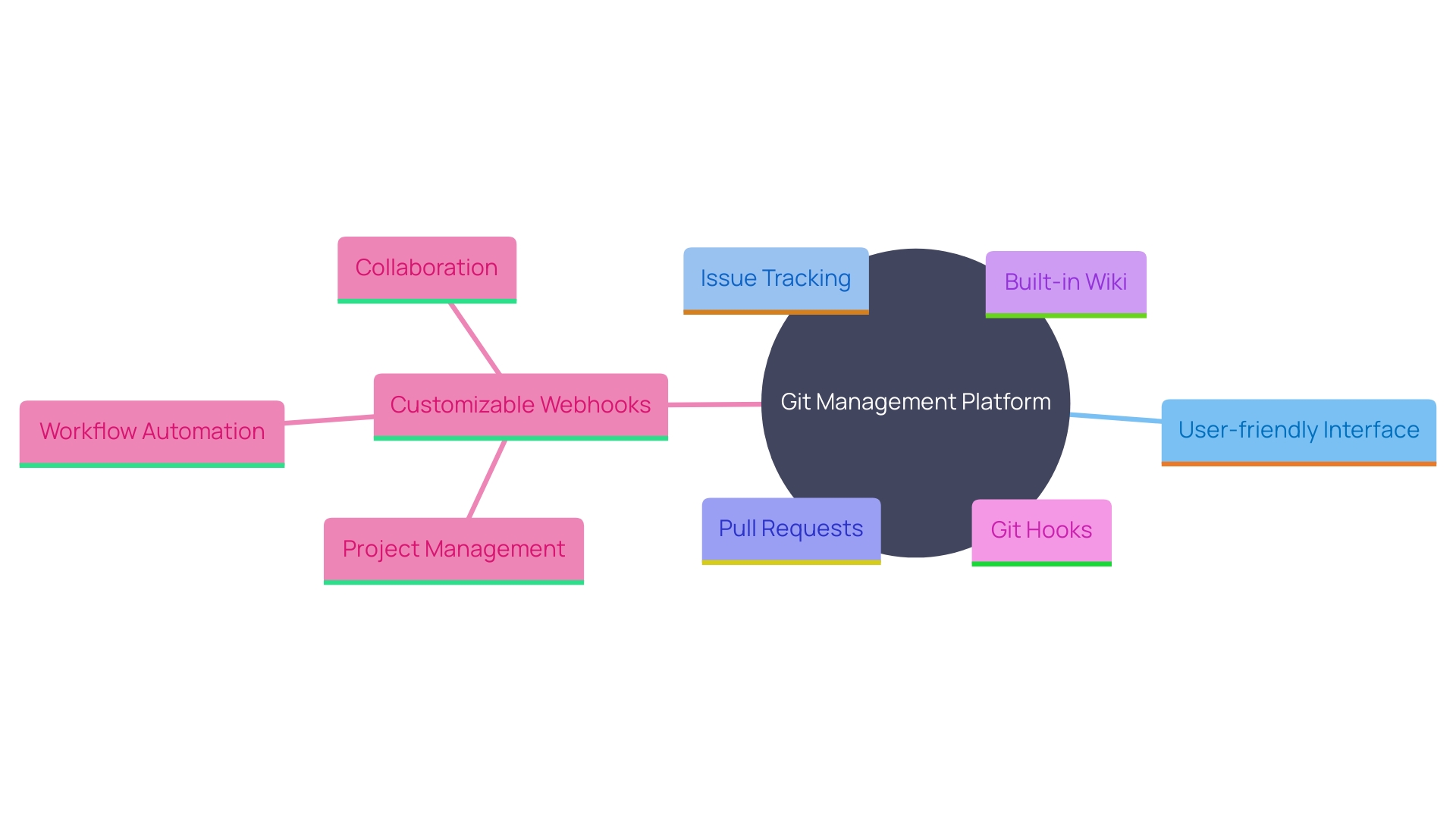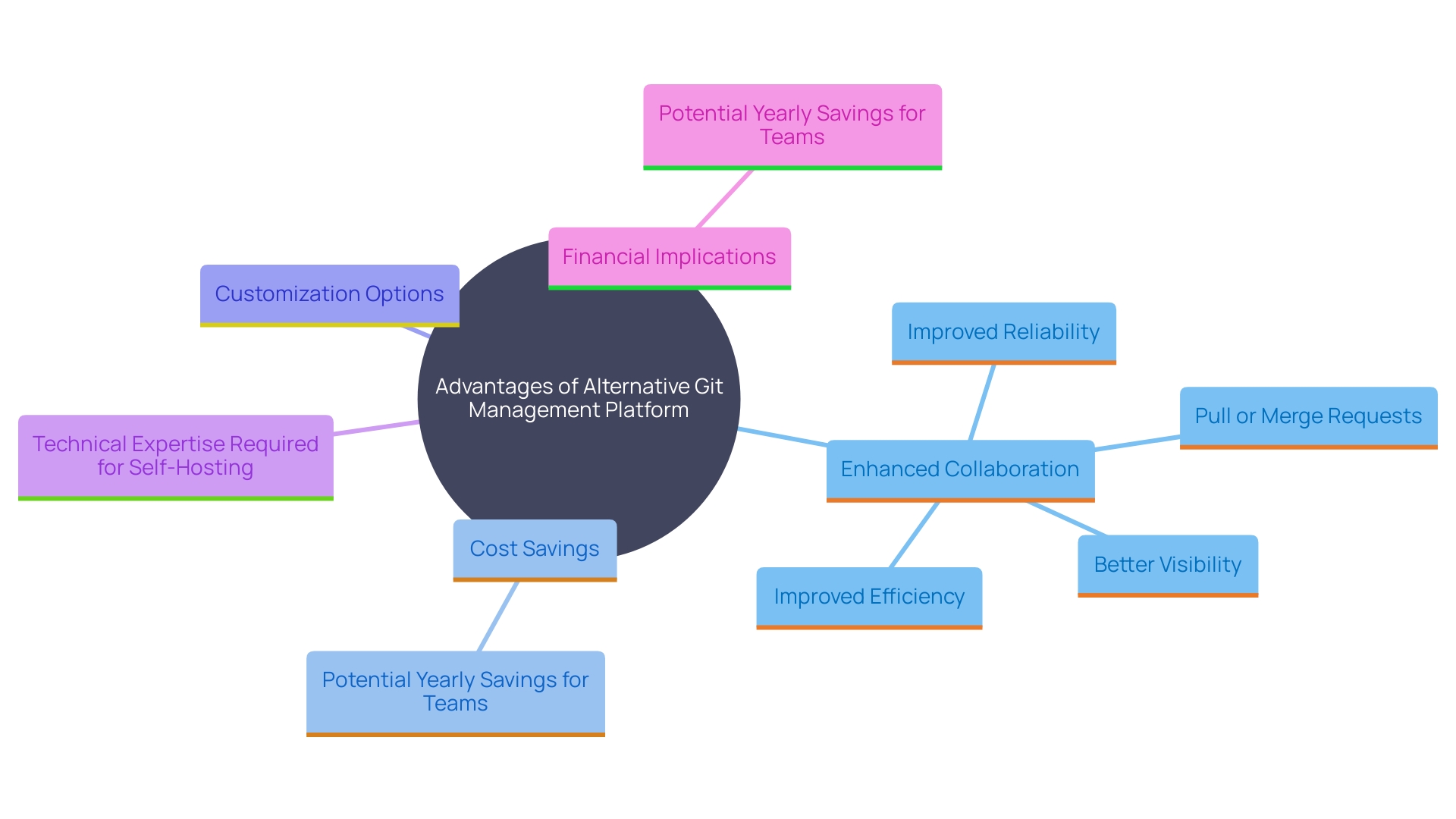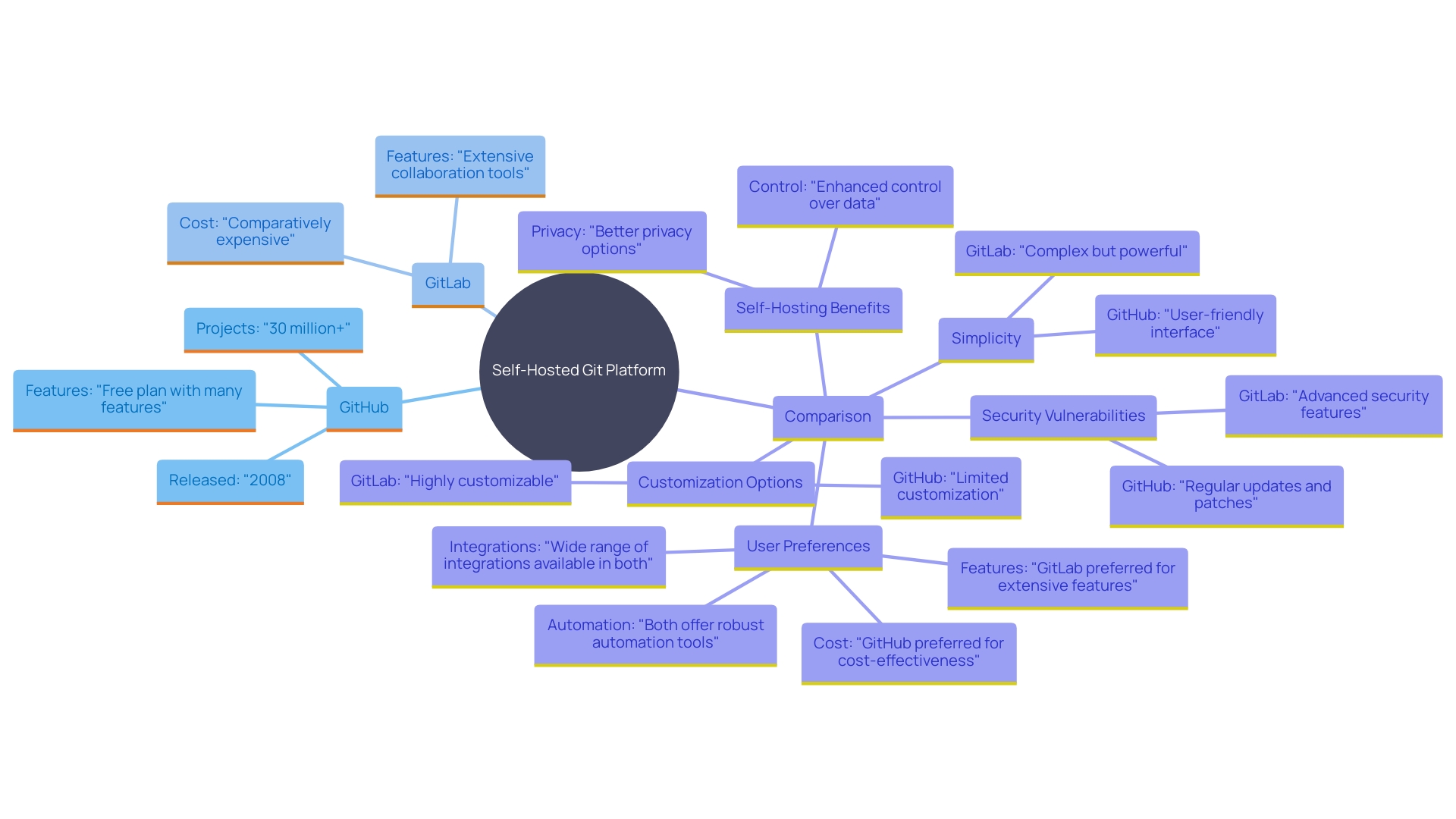Introduction
Managing Git repositories is a crucial aspect of modern software development, and choosing the right platform can significantly impact efficiency and productivity. Gogs, an open-source, self-hosted Git service, offers a compelling solution with its simplicity and powerful features. Designed for ease of use, Gogs enables users to establish their own Git server with minimal configuration, making it an ideal choice for individuals and organizations seeking control over their codebases.
Despite its strengths, Gogs has faced criticism due to unresolved security vulnerabilities, prompting some users to explore alternatives like Gitea. This article delves into the key features, installation methods, and benefits of using Gogs, while also comparing it with other popular Git services to provide a comprehensive understanding of its potential in boosting development processes.
What is Gogs?
This platform is an open-source, self-hosted Git service designed for simplicity and power in managing Git repositories. It allows users to establish their own Git server with minimal configuration, making it an attractive option for both individuals and organizations who wish to retain control over their codebases. The lightweight nature of this tool ensures it can operate on various platforms, providing flexibility in deployment. However, despite its advantages, this system has faced scrutiny due to several unresolved vulnerabilities. According to reports, the maintainers of the software have not implemented fixes for these vulnerabilities, which are still present in the latest release (0.13.0) and the latest commit. 'This has led to concerns about its security, especially given that 7,300 open instances were found online, with significant numbers in China and the United States.'. Users are advised to monitor their network activity for signs of exploitation and consider alternative solutions like Gitea, which has been more actively maintained and includes fixes for the identified issues.

Key Features of Gogs
This platform is a powerful tool designed to streamline Git management with a host of features tailored for developers. It offers a user-friendly interface that simplifies navigation and operation, supporting multiple repositories to cater to diverse project needs. The inclusion of issue tracking and pull requests facilitates efficient project management and collaboration. Additionally, the platform integrates a built-in Wiki, enhancing project documentation and knowledge sharing.
The platform's support for Git hooks and customizable webhooks provides developers with the flexibility to automate workflows and integrate with third-party services seamlessly. This comprehensive toolset ensures that the platform meets the evolving demands for agility, scalability, and performance in version control systems. This makes this platform not only a robust choice for managing source code but also a pivotal tool in maintaining the integrity and efficiency of development processes.

Installation Methods for Gogs
This platform provides a range of installation techniques to accommodate various requirements. One popular approach is using precompiled binaries available for various operating systems, which simplifies the setup process. For those working with containerized environments, deploying the application via Docker provides a seamless integration and isolation. Additionally, users who seek a more tailored setup can compile the software from source, allowing for customized configurations. Each method ensures a straightforward installation process, making it accessible for diverse server environments.
Benefits of Using Gogs
Using an alternative platform for Git management provides strong control over repositories, removing dependence on external services. The platform enhances collaboration through its user-friendly interface and features, significantly boosting team productivity. Moreover, it is a highly cost-effective solution, particularly beneficial for startups and small businesses, as it is free to use. However, it is essential to note that self-hosting solutions require a certain level of technical expertise for installation, configuration, and maintenance. Despite these technical demands, the long-term financial benefits and the ability to customize the software to meet specific needs make it an attractive option. According to a recent study, avoiding subscription fees and having the flexibility to scale resources without additional costs can save companies up to $1.8 million per year for a team of 100 developers. This makes this option a compelling choice for those seeking both economic and functional efficiency.

Comparison with Other Git Services
When comparing this platform with other Git services like GitHub and GitLab, several critical factors emerge. This tool distinguishes itself with its lightweight nature and straightforward installation process, making it particularly appealing for users who prioritize simplicity and efficiency. Unlike GitHub, which offers extensive community features and integrations, this platform provides a more streamlined experience allowing for greater control over the hosting environment.
Organizations often favor this platform for its self-hosting capabilities, which ensure data privacy and security. Self-hosting with this platform enables companies to apply their own security measures and protocols, minimizing the risk of data breaches or unauthorized access by outside entities. This approach can also be cost-effective in the long run, as it eliminates ongoing subscription fees and offers the flexibility to scale resources according to need.
Moreover, self-hosting with this platform allows for extensive customization, enabling organizations to modify the software to meet specific requirements, integrate with other systems, and tailor the user experience. 'This customization capability, combined with the reliability and performance benefits of managing one's own servers, makes this software an attractive option for many.'.
However, it is essential to note the security vulnerabilities reported in the system that remain unaddressed. This has led some users to switch to Git, a branch of another platform that is more actively maintained and has already addressed these vulnerabilities. Despite these concerns, Gogs remains a viable option for those who require a lightweight, self-hosted Git solution with a focus on simplicity and control.

Conclusion
Gogs presents a compelling option for those seeking a self-hosted Git service that combines simplicity with powerful features. Its user-friendly interface, support for multiple repositories, and built-in collaboration tools significantly enhance productivity for individuals and teams alike. The flexibility offered by various installation methods, including precompiled binaries and Docker deployment, ensures that Gogs can be tailored to fit diverse technical environments.
Despite its strengths, Gogs has faced criticism regarding unresolved security vulnerabilities, which has prompted some users to explore alternatives like Gitea. However, for organizations that prioritize control over their codebases and prefer a lightweight solution, Gogs remains a viable choice. The cost-effectiveness of self-hosting can result in substantial savings, particularly for startups and small businesses, making it an attractive option for those looking to maximize both economic and operational efficiency.
In summary, while Gogs offers a robust set of features and the flexibility of self-hosting, it is essential for users to weigh the potential security concerns against the benefits. For teams willing to navigate these challenges, Gogs can serve as a powerful tool in managing Git repositories effectively and efficiently.
Frequently Asked Questions
What is this platform?
This platform is an open-source, self-hosted Git service designed for managing Git repositories with simplicity and power. It allows users to set up their own Git server easily and retains control over their codebases.
What are the advantages of using this platform?
The platform is lightweight and can operate on various platforms, providing deployment flexibility. It offers a user-friendly interface, supports multiple repositories, and includes features like issue tracking, pull requests, and a built-in Wiki for project documentation.
Are there any security concerns associated with this platform?
Yes, this platform has faced scrutiny due to unresolved vulnerabilities that remain in the latest release (0.13.0) and commit. Users are advised to monitor their network activity for signs of exploitation, as there are over 7,300 open instances online, particularly in China and the United States.
What alternatives are available to this platform?
Users may consider alternatives like Gitea, which is actively maintained and has addressed the identified security issues in this platform.
How can I install this platform?
The platform offers various installation methods, including precompiled binaries for different operating systems, Docker for containerized environments, and the option to compile from source for customized setups.
What are the benefits of self-hosting this platform?
Self-hosting provides strong control over repositories, enhances collaboration, and is cost-effective, especially for startups and small businesses. It eliminates subscription fees and allows for resource scaling without additional costs.
What technical expertise is required for self-hosting?
Self-hosting requires a certain level of technical expertise for installation, configuration, and maintenance. However, the long-term financial benefits and customization options make it an attractive solution.
How does this platform compare to GitHub and GitLab?
This platform is distinguished by its lightweight nature and straightforward installation. Unlike GitHub, which has extensive community features, this platform offers a more streamlined experience for those prioritizing simplicity and control.
What customization options does this platform offer?
Self-hosting allows organizations to modify the software to meet specific requirements, integrate with other systems, and tailor the user experience according to their needs.
Is this platform still a viable option despite the security vulnerabilities?
While there are security concerns, this platform remains a viable option for users who need a lightweight, self-hosted Git solution focused on simplicity and control. Users should weigh the pros and cons based on their specific needs and security requirements.




